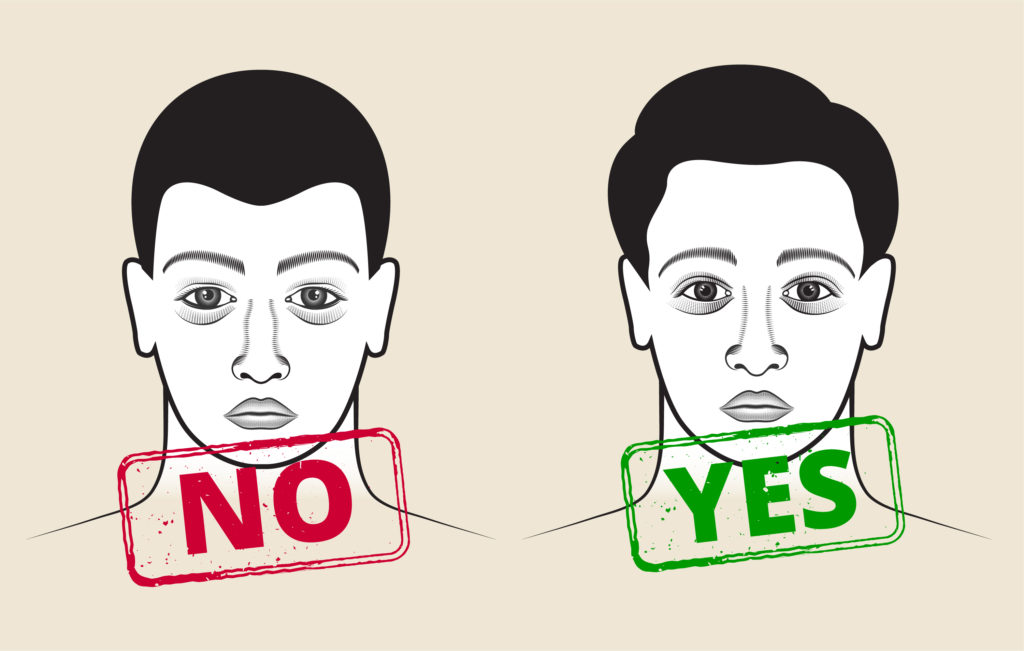
It is totally possible to say no at work and in life. You have to embrace the consequences like an adult.
Sometimes saying no means that people will hate you.
Openly. With a passion. My boss once asked me to chip in on a project. I said no because I had perfect work-life balance. Also, I thought she could deploy internal resources differently, and I offered to help with that project. She wasn’t happy, and I was seen as a punk-ass kid, but I knew she wouldn’t be my boss forever. It was a tough conversation but worth it.
There are other times when saying no to X means that you’re saying no to Y.
I have known colleagues who couldn’t relocate due to family commitments. Just because your wife is qualified for a job in Ottawa doesn’t mean you can uproot your lives and move. Talent mobility tools can’t capture the hearts and minds of trailing spouses and children. Saying no to new opportunities meant kissing long-term career prospects goodbye.
I’ve also worked in places where you say no and people don’t listen.
Do you have a guy in your office who asks you the same question over and over again? Just like a toddler, you can ask me seven times in seven different ways, and the answer will still be the same.
I’ve learned the hard way that saying no is tough.
Here are my rules for saying no.
1. In a professional context, I use the word sparingly. When I say it, I mean it.
2. The word maybe is better than the word no. It gives you time to think and look for a compromise.
3. The human ear is trained to hear the word no and ignore it. I cut people a little slack if they hear it but press forward.
But let me throw something out there: if you’re struggling with the word no, you are struggling with boundaries. You may not have them. Your boundaries may not be respected by your colleagues, partners or peers.
I think it’s important to spend a few minutes — locked in a bathroom stall, sitting in the front seat of your car — and figure out what you stand for in life and why that message isn’t clear.
Have you made yourself heard? Are you being bullied? Do you work in a boorish and disrespectful office environment?
Sometimes people don’t listen to us when we say no because we don’t explicitly say it, and we don’t truly mean it.
Say it. Mean it. Move forward with conviction. That’s the only way to say no in life and feel okay about the consequences.
I don’t struggle with saying “no.”
Nine times out of ten… something makes sense or it doesn’t. … there’s a valid reason or there’s not … it’s counter to policy or it’s not .
What I struggle with is the constant push back and frequent refusal to accept my “no.”
In one facet of my business (a rather large facet) I deal with real estate salespeople. They often insist upon a particular course because they believe it will help them make more money.
I can appreciate that. They’re in business to make money. And I’m supposed to help facilitate their efforts, which I work very hard to do. Except when I can’t (for whatever reason). Unfortunately as salespeople, they’ve long been trained to “refuse to take no for an answer.” Thus they just keep SELLING me. And selling me. And selling me.
My frustration here is two fold:
When the answer is no, it’s no. It’s not an arbitrary decision. There’s reason and logic and policy backing up a well-thought out decision, generally made long before their request came along. Continually SELLING me just wastes both of our time. And I can’t help but become resentful (and at times hostile).
Even worse, I’ve developed a reputation as the bad guy who always says no. Meanwhile all the other (considerable) work I do is forgotten.
As a result I have contentious relationships with many salespeople I’m supposed to serve.
And it’s grown to the point where every time I have to say no, I question myself. I’ve begun to buy into the notion that I’m the “bad guy.”